The Coming of Conan Re-Read: “The Hyborian Age”
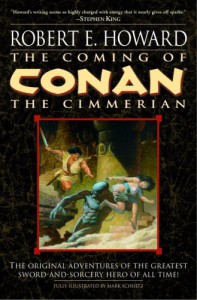 Bill Ward and I are starting our read of the first of three Del Rey collections of Robert E. Howard’s Conan stories, The Coming of Conan. There have been many other collections containing the stories within, so even if you don’t have this particular volume we hope that you’ll join us. This week we’re looking at an essay Robert E. Howard wrote about the world Conan adventured in titled “The Hyborian Age.”
Bill Ward and I are starting our read of the first of three Del Rey collections of Robert E. Howard’s Conan stories, The Coming of Conan. There have been many other collections containing the stories within, so even if you don’t have this particular volume we hope that you’ll join us. This week we’re looking at an essay Robert E. Howard wrote about the world Conan adventured in titled “The Hyborian Age.”
Bill: As you said last week, Howard, “The Hyborian Age” isn’t the place to start if you are new to Conan, in fact I’d say it’s really only interesting if you are already familiar with Conan’s world, as well as the enthusiasms of Conan’s creator. REH himself didn’t start with “The Hyborian Age,” either, he started with the character of Conan, only settling down to iron out his “world bible” once he had three Conan stories under his belt and realized he wanted to write many more (for this, and a lot of other background information on REH and Conan in particular, Patrice Louinet’s essay “Hyborian Genesis” at the back of The Coming of Conan is a great resource that I’m sure we’ll both be referring to again and again as we read through these early tales). As a standalone piece, which it was never intended to be although REH did eventually make it public, “The Hyborian Age” isn’t really that compelling or entertaining, it’s just there to get the background of Conan’s world down in a concrete way so REH would have a reference as he wrote.
Howard: Right — and I have to confess, REH fan though I am, I’ve never made it all the way through until now. You can definitely see REH’s fascination with history on center stage through most of this.
Bill: “The Hyborian Age” is all about history. It’s the history of a lost age before the rise of the civilizations we are familiar with, but it’s also a way of getting around history. REH wrote fast and he wrote for publication and, though he loved history and writing historical fiction, he felt it took too much time to get the research just right. Enter the secondary world of his own slice of pre-history, a way of not only having a world he didn’t have to exhaustively research, but also a vehicle for bringing together the character and flavor of many different cultures and eras that would allow Conan to adventure in the equivalent of everything from the Ancient Near East to Medieval France. That may not be completely clear just from reading “The Hyborian Age,” but it is clear from the stories themselves, as well as by glancing at the two maps REH used when planning his world — his Hyborian Kingdoms superimposed over a map of Europe, North Africa, and the Near East is probably even more eloquent than his essay, which seems overly concerned with barbarian migration and the physical appearance of various peoples.
Howard: Indeed it does — and it’s strange, given REH’s incredible gift for pacing, that he didn’t notice that. But then, as you said, this piece wasn’t originally intended for anyone but him. Even though it was planned as a historical overview of sorts, once Robert E. Howard slips briefly into narrative drive there’s no stopping him and the tale of the rise of the Picts catches fire — until REH switches back again to his sweeping overview of migrations, carrying us toward the present day.
Bill: Right, the one piece of narrative is by far the most enjoyable aspect of the essay. For the rest, I’d say it’s really at the intersection of REH’s world and actual history where we get a look at the particular genius of REH’s Hyboria. By keeping the world almost like ours, by using names that, whether an original coinage or lifted from myth and history, already seem familiar or reminiscent of actual places and cultures, REH creates a place that doesn’t need a lot of explaining. In a way, it’s almost an act of anti-world-building — unlike modern authors of fat fantasy that often concern themselves with creating copious amounts of original history, cultures, religions, and races, REH was trying to keep things at a minimum in the service of short stories that did not have the space to waste on large chunks of background. His world is just familiar enough that we instinctively get it, but also exotic and strange in ways that convey a sense of wonder and mystery.
Howard: An excellent point, and one I get tired of having to raise when I defend Howard’s work. (I mean REH’s work. There’re a lot of Howards around here.) The cultural names reminiscent of historical ones were designed to evoke an atmosphere so that the reader would have to do less work to envision what was happening. And I suppose that all REH’s work describing movements of people and their different racial characteristics at least helped him figure out what the inhabitants of various nations looked like.
Bill: Exactly. The rational and pedantic Lovecraft criticized REH’s naming conventions, but the romantic — and in a hurry — REH knew just how much of a real-world link he needed to get the verisimilitude of these stories right. In reading “The Hyborian Age” it seems clear that the world itself is not the star or even the starting point for these stories, it’s more like the seasoning on the big, meaty steak of Conan’s adventures.
The essay itself echoes some of REH’s most abiding interests, the rise and fall of civilizations and the cycle of barbarism, the evolution, decline, and migration of races, and, of course, the Picts. The Picts, in fact, are more or less the central figures of “The Hyborian Age,” despite only ever appearing in a handful of Conan stories (or just one? I’m operating from memory). The Bran Mak Morn and King Kull stories were both of relatively recent vintage when REH wrote “The Hyborian Age,” and many of the elements of those tales, and specifically their depiction of the Picts, fits right in with the lost continents and devolved races of the essay. It seems to me that “The Hyborian Age” is more than REH sitting down to draft a bunch of useful names and background for his new world, it’s really a synthesis of a lot of the elements that had appeared in his previous fiction, a culmination of his passions and ideas in a way that informed, but also freed, the Conan stories that were about to burst from his typewriter.
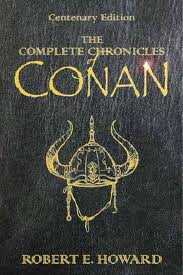 Howard: Absolutely. I’m a little mystified about why these particular issues, particularly the Picts, interested him so much, but then maybe he would have scratched his head and wondered why I’ve tracked down every song Pete Ham ever wrote.
Howard: Absolutely. I’m a little mystified about why these particular issues, particularly the Picts, interested him so much, but then maybe he would have scratched his head and wondered why I’ve tracked down every song Pete Ham ever wrote.
Bill: I’m sure he would have dug Badfinger, at the very least. I’ve read that REH’s Scottish heritage prompted him to do a lot of reading on the subject of Picts, and I suppose the mystery of the painted savages of the north just took hold of his imagination, especially at a time when less was known about their origins. I’ve often thought that REH and his contemporaries lived at a kind of crossroads of information, a time when a lot of knowledge was becoming readily available, but it was still possible to give credence to the notions of Atlantis and Lemuria, of lost races devolving into sub-humans in some forsaken wilderness, or pockets of advanced civilization from some long-forgotten age of pre-history existing just off the edges of the map. In an era when the map no longer has any edges, when Mars is a lifeless desert and the human genome itself has been mapped, I think it would be hard to be as passionate about much of the pseudo-science of that era in the way REH so evidently was.
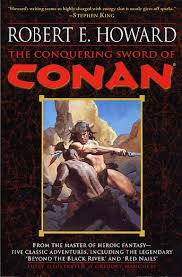 Much of the criticism of “The Hyborian Age,” aside from its fairly unexciting presentation, could easily stem from REH’s notions of evolution and race — white arctic apes becoming human in a case of parallel evolution and other races actually becoming ape-like as they slump away from their ancient civilized origins is bad science in a context where no science at all would be preferable. In terms of race I’m not speaking at all about racism, but about REH’s preoccupation with what stock merged with what to produce who, and what they looked like, which dominates a lot of the essay. Much of that gives the Hyborian tales its cosmopolitan flavor — and shows again that the author’s initial preoccupation was with creating concrete details that he could draw on for his fiction — but it also renders the essay somewhat tedious in places and also, again, runs into some areas of pseudo-science or out-of-date notions that, at best, make the piece seem quaint or, at worst, a bit silly.
Much of the criticism of “The Hyborian Age,” aside from its fairly unexciting presentation, could easily stem from REH’s notions of evolution and race — white arctic apes becoming human in a case of parallel evolution and other races actually becoming ape-like as they slump away from their ancient civilized origins is bad science in a context where no science at all would be preferable. In terms of race I’m not speaking at all about racism, but about REH’s preoccupation with what stock merged with what to produce who, and what they looked like, which dominates a lot of the essay. Much of that gives the Hyborian tales its cosmopolitan flavor — and shows again that the author’s initial preoccupation was with creating concrete details that he could draw on for his fiction — but it also renders the essay somewhat tedious in places and also, again, runs into some areas of pseudo-science or out-of-date notions that, at best, make the piece seem quaint or, at worst, a bit silly.
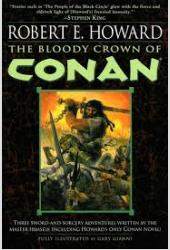 Howard: I’m afraid that I was a little too bored to focus on the silliness, apart from the aforementioned rise of the Pict empire, which I quite liked. Two or three of those vast sweeps of imaginary people going back and forth had the same effect on me as watching an out-of-town team play a sport I don’t care about while I’m sitting with a friend. I felt obligated to be there and tried to have a good time, but I just wasn’t very interested.
Howard: I’m afraid that I was a little too bored to focus on the silliness, apart from the aforementioned rise of the Pict empire, which I quite liked. Two or three of those vast sweeps of imaginary people going back and forth had the same effect on me as watching an out-of-town team play a sport I don’t care about while I’m sitting with a friend. I felt obligated to be there and tried to have a good time, but I just wasn’t very interested.
Bill: Agreed, which is why I’d really only recommend “The Hyborian Age” for someone who is interested in REH the writer and the man, and not just or specifically Conan. It isn’t necessarily very satisfying as an exploration of Conan’s world — the stories themselves do it better — but more so as an exploration of REH’s process.
Howard: I’m looking forward to the stories, and we’ll be reading the first one next week, “The Phoenix on the Sword.” Hope to see you here.
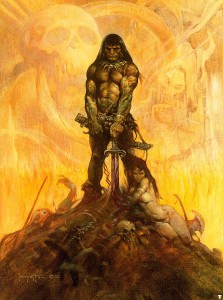
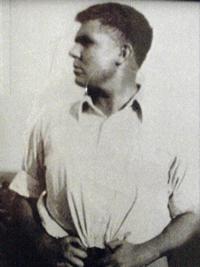
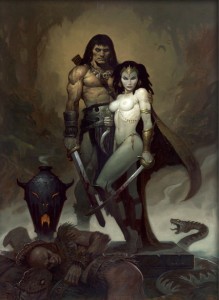
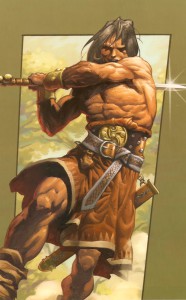
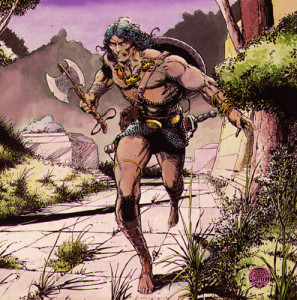
24 Comments